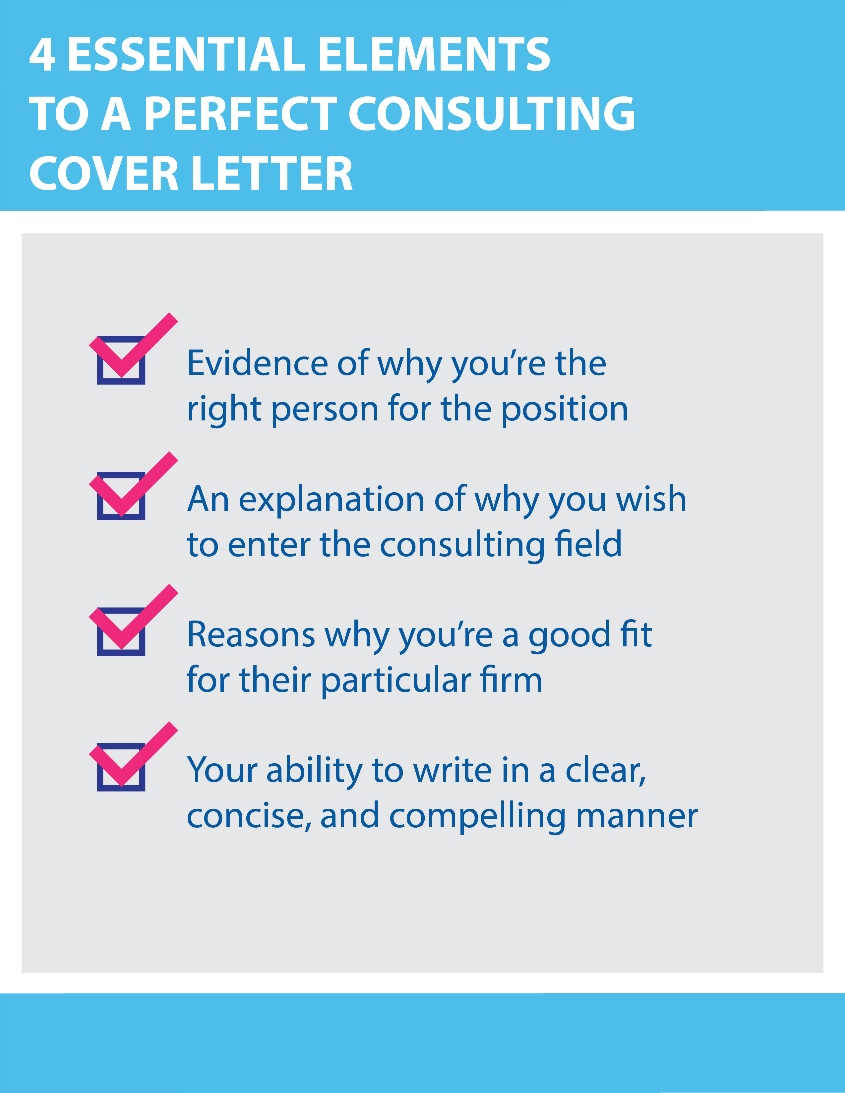FREE Resume Tips Email and Video Series
This form collects your name and email so that we can add you to our email list that delivers the free resources you are requesting. Check out our privacy policy for details on how we protect and manage your submitted data.
We’ll never spam you or share your email. Unsubscribe at any time.
Your cover letter can make a big difference when applying for a management consulting position. Because the cover letter is typically read before your resume, it plays an essential chronological role during the application process.
Consulting firms will typically read your cover letter to quickly identify what makes you different from thousands of other applicants. Therefore, writing a strong and unique cover letter can make you stand out from the competition and ensure that your achievements aren’t overlooked.
A strong cover letter presents an excellent opportunity for you to demonstrate why you’re the best candidate for the job, and to plead your case as to why the firm should hire you over other applicants.
This guide will cover 11 essential steps towards writing the perfect consulting cover letter.
Tip 1 — Know What Consulting Firms Are Looking For
The top consulting firms receive hundreds of thousands of applications each year. For example, McKinsey receives approximately 200,000 applications annually, of which only 2,000 applicants receive an offer. Consulting firms are faced with the arduous task of narrowing down the candidate pool to include only the best.
Interviewing candidates is not a cheap process. The firm wants to ensure that any candidate they interview is qualified for the position, is prepared for management consulting as a career, and is a good fit for the firm.
Therefore, top consulting firms look for four essential elements in a cover letter.
- Evidence of why you’re the right person for the position
- An explanation of why you wish to enter the consulting field
- Reasons why you’re a good fit for their particular firm
- Your ability to write in a clear, concise, and compelling manner

When reading cover letters, screeners will often ask,“Did the applicant spend enough time preparing a strong letter? Have they done their homework regarding the firm and the position in question? Do they have adequate writing skills to prepare compelling emails, reports, and presentations?“
A cover letter is a challenging document to prepare. You may feel worn out after spending hours on your resume, only to realize that you also need to spend as much time (if not more) on your cover letter.
Rather than looking at your consulting cover letter as an annoying extra step, think of it as an excellent opportunity to emphasize your skills and experiences and to set yourself apart from other applicants.
Tip 2 — Make Sure the Letter Has TheseFiveDistinct Sections
While your cover letter doesn’t need to take a formulaic approach, there are five distinct sections that should be covered. They are:
- An Introduction
The introduction should contain which position you’re applying for, your name, address, and contact information. It should also be short, sweet, and entertaining. Write it in such a way that the screener will want to keep reading into the second paragraph.
- Why You’re a Great Candidate
This is the section where you should blow your own horn. Each sentence should speak to your skills, education, and experiences — tying everything back to why you’re a great candidate. Ideally, this section should include your top three achievements to date (relevant to consulting, of course).
- Why Consulting is the Right Fit for You
Remember that the top priority of most consulting firms is to find out whether you’ll become a great consultant if hired. Even with memorable and unique qualifications, a recruiter may not be convinced that these skills will make you a good management consultant. To leave no doubt in their mind, dedicate a section towards explaining why you’re the right person for the job. You can use previous experiences (such as internships, jobs, or academic courses) to tie your career goals to the position in question.
- Why You’re Applying for the Position
The next section should cover why you chose to apply for this exact position in this firm. When laying out your case, identify unique reasons as to why you think McKinsey, Bain, BCG, Deloitte, or any other firm is your firm of choice. To make a compelling argument, identify specific people, reports, or projects that make your story believable. Don’t hesitate to mention specific employees or projects that caught your eye and sparked your interest.
- A Solid Conclusion
Finalize the letter by restating why you believe you’re a great candidate and how you can be of value to the company.
Tip 3 — LinkYour Cover Letter to Your Resume

A consulting cover letter is essentially an opportunity for you to expound on the information you wrote in your resume. What does this mean? It means that your cover letter should highlight the unique achievements, skills, and experiences (relevant to the position) that make you stand out from other applicants.
Your resume and cover letter should work hand in hand to strengthen your application further and demonstrate what makes you stand out.
Start off by identifying what you want the consulting firm to know about you. Draw attention to your career achievements. Maybe you started a business and sold it for a significant profit, or you worked overseas for a few years and have a diverse skillset.
Make sure that unique experiences are mentioned in the first few paragraphs of your cover letter to pique the interest of the resume screener.
Many resume screeners don’t actually read your entire resume.They simply scan it to identify specific items that make you stand out. Because resume screeners scan through hundreds of resumes at a time, they can easily overlook your unique achievements.
The cover letter is your opportunity to prevent this from happening. When you go into detail about achievements in your cover letter, you essentially draw the attention of screeners (and thus give yourself a better chance to land an interview).
Tip 4 — Don’t Forget About Your Resume
Even after referencing the unique skills you have in your cover letter, you need a strong consulting resume to back up your claims. A consulting resume is different from other standard template resumes, as it needs to emphasize a combination of skills that can make you successful as a consultant.
Here are resources that can help you prepare a strong consulting resume. A quality consulting resume will take just as much attention to detail as writing a strong cover letter will. In a nutshell, writing a consulting resume requires you to reflect on your past experiences, select the ones that are most relevant to consulting, and summarize them in a manner that resume screeners can easily scan and digest.
Top consulting firms typically look for the following in your resume:
- Big brand names (employers and schools)
- Strong academic performance (high GPA)
- Strong analytical skills (demonstrated in high standardized test scores)
- Strong leadership and communication skills
- Achievements versus career years (the longer your career is, the more achievements that screeners expect to see)

Also, refer to this resource to identify the top five mistakes that applicants make when writing a consulting resume.
Tip 5 — Avoid Using a Standard Template for Your Cover Letter
It’s no secret that it can be a pain to write a strong cover letter. It takes a lot of time and reflection. You’ll have to revise and edit the piece multiple times before submitting it. But, to truly stand out from other applicants, your letter needs to be interesting, personal, and unique.
The biggest mistake you can make is to copy a standard cover letter template and simply plug in your name and skillset. Screeners hate standard form letters because they’re boring to read, and they show that you’re unwilling to put in the necessary time and effort to write something unique. Because recruiters read thousands of cover letters, they can easily tell when a cover letter is written from a template.
When writing your consulting cover letter, make sure that every sentence is unique. While you may draw inspiration from various templates, add your personal twist to each word and modify it in a manner that emphasizes your unique skillset. For example, instead of starting with the usual format:
“Dear Sir/Madam, I write to apply for a consulting position….”
You can make things more interesting by starting off with what makes you different. Here’s an example:
“After attending Harvard for both my undergraduate and MBA education, I am confident in my ability to become successful as a [insert job position here] at McKinsey.”
Another example:
“My experiences overseas as a Peace Corps volunteer put me in a position to be successful as a [insert job position here] at BCG.”
The idea is to make every sentence in your cover letter count. Add a personal twist to all ofyour skills and experiences and tie them to the job responsibilities of the open position.
Tip 6 — Highlight Your Skills and Experiences via Evidence-Based Storytelling
In your cover letter, the goal should be to tell your story. Rather than simply listing your skills and abilities, demonstrate how various experiences have molded you into the perfect candidate for the position in question. Strive to show that you have what it takes, instead of telling.
For instance, instead of simply stating that you can lead, give a specific example of an experience where you showed leadership qualities. This evidence-based approach shows recruiters that your prior experiences have equipped you with the necessary skills to be successful.
Telling a story makes your cover letter much easier to read. It also makes you stand out from thousands of other applicants who may simply state “I’m a leader,” or, “I’m a hard worker.”
As you use this evidence-based approach, tailor every experience you mention to a specific skillset that is required for the job. If the position requires a candidate with strong interpersonal skills, explain a time when you worked within a team to achieve tangible results. Also, list out any challenges and how you overcame them.
It’s not simply about telling a story. Rather, it’s about telling a story that highlights why you’re a good fit for the job, as well as what makes you stand out from the competition.
Tip 7 — Show Your Value
A common mistake that many applicants make is to only think about personal achievements when applying for consulting positions. Recruiters often read through cover letters that have lots of “me meme” in them.
This is to say that many applicants focus on how they can benefit personally from the position in question, instead of demonstrating how they can become valuable employees (and eventually partners).
Many cover letters talk only about how the candidate will be able to elevate his/her career, experiences, and skills. Such letters only focus on personal goals instead of demonstrating how you can help the company become better. Remember that screeners are looking for candidates who will be of benefit to the firm, not those who are simply using this as an opportunity to enrich themselves and their careers.
When writing your cover letter, emphasize how your skillset will be of benefit to the company. To do this successfully, you need to do your research with regards to what the short-term and long-term goals of the firm are. You can then use these goals and relate them to your unique abilities and experiences.
Tip 8 — One Page Is the Perfect Length
It can be tempting to write a long cover letter, especially if you have a diverse skillset that you feel should be highlighted. However, being concise and keeping it relevant to the position is a much better strategy.
Aim to select only the most relevant experiences that apply directly to the position you’re seeking. You can typically fit these experiences in only one page.
Being concise also makes it easier for recruiters to read through your cover letter quickly without overlooking anything. Edit it down to a concise letter by re-reading and adjusting your original cover letter. The more you read it, the more unnecessary words and content you will find to take out.
Start early so that you can give yourself plenty of time to adjust your cover letter accordingly.
Tip 9 — Be Specific About the Position You’re Applying To
While this may sound obvious, many applicants tend to go off on a tangent about their skills and abilities without first mentioning the job they’re applying for. You should always state the position and office of the job you intend to apply for within the first sentence.
Remember that this information can still be included as you emphasize what makes you different. Here’s an example of an opening sentence that was used earlier in this guide:
“My experiences overseas as a Peace Corps volunteer put me in a position to be successful as a [insert job position here] at BCG.”
Being specific and concise about the job you’re applying for will make it easier for screeners to quickly recognize which position you are interested in.
Tip 10 — Give Yourself Time to Write a Quality Letter
Similar to consulting resumes, writing a strong consulting cover letter takes time. To be successful, you need to consider everything you’ve accomplished as well as what makes you different from everyone else. Don’t think that you can write a strong cover letter in one night. It requires multiple iterations, careful re-reading, and timely feedback.
You also need to make sure that the cover letter blends seamlessly with your resume, and it expounds on the outstanding skills and experiences contained in the resume itself.
Tip 11 — Proofread Thoroughly

And finally, make sure you eliminate any grammatical or spelling mistakes from the final cover letter. These mistakes make you appear careless and can result in being disqualified in the screening process. Don’t let something so simple be your downfall.
Take time to proofread. Ask peers and fellow professionals review your cover letter and give you feedback as well.
Example
Here is an example cover letter that highlights the tips I’ve mentioned. Reference this example as you write your cover letter to make sure that you hit all of the important sections. These items do not necessarily need to appear in the order I have them listed. But, make sure that they are all represented in your cover letter. Below is an example consulting cover letter.
You can also download the example by clicking here.

More Resources:
Free Case Interview Prep Program – Sign Up For Free Instant Access to the Largest Collection of FREE Case Interview Training Resources.
We’ll never spam you or share your email. Unsubscribe at any time.




219 thoughts on “Consulting Cover Letter Tips (and Template)”
Hi Victor,
I’m doing 1st year MBA from non target school with GMAT 670 and GPA 3.75. School is ranked in late 20’s. I’ve 8 years of work experience in IT consulting.
I’m an international student. With these credentials, Can I aspire to become an management/BT consultant in US?
Your response is greatly appreciated.
Hello Victor,
I am an undergraduate student at UCLA with a GPA of 3.7 and SAT scores of 2200. My resume highlights are that I have over 15 weeks worth of experience working in a small consulting firm in the Los Angeles area, two other small internships that involved computer science and accounting. I also hold a couple officer positions for medium size clubs.
Because I feel that my resume doesn’t set me apart as the best of the best (which I am!), I wanted my cover letter to accomplish that. Would you say an unique cover letter can include a rather frank tone or a few jokes?
Thanks for ALL your information. It really has made a significant difference in my confidence for case interviews.
Sincerely,
Tony
Tony,
For cover letters, jokes are risky. The effectiveness totally depends on the person and you have absolutely no data on the person. In person, you can kind of tell if someone has a sense of humor or if they are ice cold. I’d stay away from jokes and simply logically argue your case and present your most relevant resume assets.
For UCLA, it would help if you knew or met someone in the firm that you can reference in your letter… Someone they know or can contact internally that can say, “Yeah, I met Tony in person. Seems like a personable guy. We can definitely put him in front of a client.”
Victor
Thank you Victor for the quick and informative reply.
Hi Victor,
I am an undergraduate from a target school looking to get into the top consulting firms. I was wondering that to better position myself for a full-time consulting job, is it more helpful to do a banking internship (I had an offer from Morgan Stanley) or a second tier consulting internship? I know that it is a trade off between big names and relevant experience, and I have been struggling to make a decision.
Thank you very much!
Alice
Alice,
Both are very good – with a slight edge to Morgan Stanley.
Victor
Hello Victor,
The article and your thoughtful comments are inspiring me to craft strong cover letters. I am applying for summer internships at MMB. I am third year undergrad at a target business school. I have a GPA of 3.84, but average math scores on the SAT of 680. I have interned for the Department of Commerce and have worked in retail. I also hold a number of executive roles in school organizations (many business related clubs). I have asked several consultants in MMB questions and I hope to include my reaction to some of their responses as well.
Are there any suggested differences in crafting a cover letter for internship opportunities? At this level, how critical is past work experiences versus grades?
Thank you!
-Carrie
Hello Victor,
I know you have emphasized in the above posts the significance of GMAT, GPA and the stellar work exp. Even then, I would like to once confirm with you about my candidature for consulting career.
– I have an MBA from a target B school (ranked well globally – below 20) however with a low GPA – 2.84
– My GMAT is average – 680
– However I have about 7 years of work experience in the best Market Research firms and have proven my analytical skills. Through these firms I have been involved in consulting for major FMCG firms, involved in global launch of green products, managed groups of people and enormous projects all over the country.
I am very passionate about green consulting and would want to help solve business concerns in this field. Do you think I can aspire for say tier 2 consulting companies?
Victor,
A consulting firm might be interested in your background, but most likely not a top firm – perhaps a smaller boutique. A GMAT or GRE score that’s higher than your GPA would normally suggest would help. It might also take working in industry for a few years and getting an MBA to pull it off.
The problem is between the non-brand university, lower gpa, and limited work experience, any one of those three areas can be compensated for, but generally not all three at the same time.
It’s possible to compensate for one of the three and maybe if you’re lucky, 2 out of 3. But 3 of 3 its very difficult, so getting to consulting might be limited to smaller firms or might necessitate an intermediate step (in work experience or going to a brand mba program usually by working in industry first) to get to your goal.
Best wishes,
-Victor
Hello Victor!
The resources in your site and the ideas it pools really are very enlightening. It really gives an insight as to the nature of the industry .
I’m a recent graduate (chemical technology and Biotechnology) from a non-brand university in Moscow. My GPA is low by consulting standards, 3.45 and 3.9 out of 5 for my BEng and MEng respectively (though there is a reason). I didn’t undergo any internship because up until about a few months ago, students were not allowed to work here. The only work experience I have is that of teaching business and financial English to members of staff (including managerial) working for international companies here. Of course I have acquired a lot of transferable skills and a general knowledge of the business and financial sectors. Considering the aforementioned, do I stand a chance with any of the consulting firms and would taking any of the specialized tests (GRE, SAT, GMAT) enhance my chances. I contacted the office here and was told resumes are to be sent only through the global site.
Thanks for your time.
Best regards,
Victor.
Hi Victor,
Thanks for the wonderful tips on website and in the newsletter.
I am from India and have around 9 years of IT-consulting experience (6 years for a top-tier IB of which 3 years in London). I’m about to finish my 1 yr MBA from a top-2 school in India and currently my GPA is 2.5/4. My GMAT was 730 (Q48,V37) and I finished my Comp. Sci. undergrad with Honors from a well-known engineering school (non-IIT).
I’m interested in BTO Consulting roles and need your help regarding :
a. I just turned 30. Does that or my 9 yrs of experience count against me ?
b. Is my low GPA a big problem for MBB ? Or should I give it a shot ?
c. Which consulting companies should I realistically target ?
Thanks for your time !
Best,
Raver
Raver,
a) Age and experience isn’t a major issue.
b) The GPA is an issue. It doesn’t hurt to try, but that GPA relatively to everything else in your “package” sticks out. I don’t know BTO that well — so it is possible your work experience will compensate for the GPA, but I somewhat doubt it will be enough to help.
I wouldn’t only rely on BTO and would suggest going after other firms as well. In terms of competitiveness in the IT consulting market, I don’t know it well enough to suggest specific firms to target.
-Victor
Hi Victor,
Thank you for the article and website!
Actually I have a question about you: How can you be so energetic and productive (as far as I know, you run two websites, wrote many books and articles, and had TV interviews).
I will be a FFY next year and I heard the consulting life is tough. So I want to keep energetic as well, like you.
Could you share some secrets about how to do that, if any? Thank you!
Rgs
Martin
Martin,
I’m not sure I’m all that energetic, though I do get a fair amount done with whatever energy that I do have.
In terms of what I do that is transferable to consulting, there are two things:
1) For the long-term important stuff, carve out X minutes per day to focus on that. Time goes by and if you’re making daily progress, you eventually get better.
2) Delegate to others whenever possible (your assistant, the graphic design person, your client team members) and focus on the activities where you add the most value per hour spent.
-Victor
For example, on this website, I’ve written 425 articles. When I actually count, I’m amazed by how many articles there are — all of you have a lot of questions!
BUT, when I break it down to a daily level — say spending 1 hour per day writing which for me is about one article. The micro level time investment is imminently achievable by anyone.
When I write articles, I imagine writing an email to a friend. So the question is could you spend an hour a day writing one really good email to a friend? I’m sure you already come pretty close to that (though it’s probably an hour on several smaller emails).
The only difference between what you already are able to do on an hourly basis and what I’ve done on this website, is I just did it every weekday for two years or so.
In short, the little daily things really add up over time.
-Victor
Hi Victor,
I am reading your book on case-interviews and the information on your website, and find it very helpful, motivating, and inspiring!
I have a phd in one of the social sciences disciplines from NYU (my department and subfield are ranked top 10 in my field). My undergraduate GPA is 4 and my graduate GPA is 3.87. I have a publication in one of the leading journals in my field, and some papers under review. I have extensive training in quantitative data analysis, experience with several statistical software packages, and some knowledge of programming for data analysis. I also have training and work experience in applied game theory. In addition, prior to grad school I gained professional experience in public sector. Non-academic jobs, and especially consulting, are appealing to me for two main reasons: 1) opportunity to work on real-world problems, and see the impact of my work; 2) team work, or at least frequent interaction with other people. I also know 3 foreign languages, in addition to English.
Given my background, do you think I have a high chance of getting an interview if I apply online? How would you suggest that I maximize my chances of being interviewed? Do you think there are any weak spots or questions that application readers might have, and that I should address in my cover-letter?
Thanks a lot,
Anna
Anna,
Your background is pretty good, but the perception of yur background will be negatively biased based on prestige of undergrad and grad institutions. You could very much fit in at a top firm – certainly top 10 if not top 3, but you’re going to need to get the attention of somebody inside the firm to more closely evaluate your background.
I think the odds of getting an interview via online application (given your background) will be substantially lower than if you apply via networking. The online application favors the qualified a candidate hitting the target criteria exactly – Ivy, 3.5 GPA, big firm internship, test scores in 95% .
There are many, many exceptions to the target critters, but they usually have a hard time getting noticed via online applications.
See my articles on networking and email my assistant Kirsten (at) caseinterview.com for details on a new program on this topic I’m pilot testing next week.
Victor